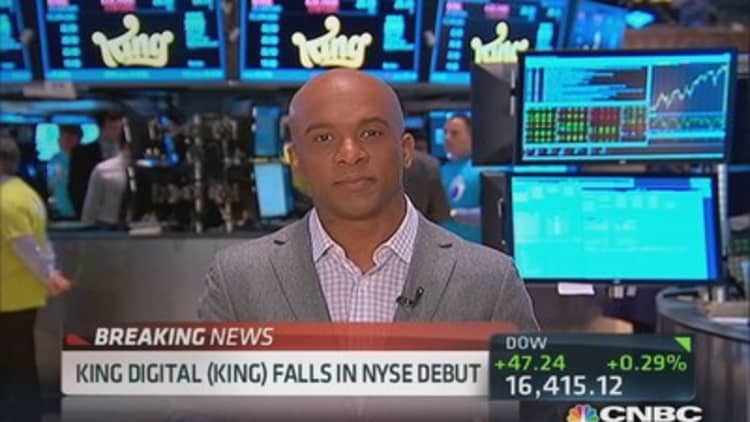King Digital took its time handing out it first earnings report today. But when it got around to it, the company behind Candy Crush delivered good news: Revenue, which had been declining in advance of its IPO this year, has ticked up again. And King is beginning to make the argument that it is not a one-hit wonder.
King generated a staggering $607 million in revenue — up 3x in the last year — and reported adjusted earnings of 61 cents a share, which grew at the same pace. Those numbers beat Wall Street estimates.
But the crucial comparisons are with the King's previous quarter. And those numbers look promising, too.
Revenue, which had declined from Q3 to Q4 last year, started growing again, from $602 million to $606.7 million. But King can boast stronger user growth numbers, which means it is finding new people to play its new games, even as Candy Crush declines. The company has 143 million daily active users, up from 124 million in Q4. And it has 481 million monthly active users, up from 408 million.
Perhaps most important: Candy Crush, which generated 78 percent of King's business at the end of last year, was only responsible for 67 percent of its business in Q1, as the King managed to find new players for games like Farm Heroes Saga.
More from Recode.net:
Nintendo's earnings worse than expected
Biggest security risk? Employee gadgets
How to get easy still photos from a video
One notable decline: The number of people spending money on King's games for virtual power-ups. King says it has 11.9 million "unique payers", which is down from 12.2 million in Q4, and down from a peak of 13 million in Q3.

That's crucial, because while King used to sell ads on its games and Web sites, it got out of that business last year. And since its games are free, it only makes money when a small percentage of its user base pays up.
King says it expected to see that decline, and says those numbers will keep dropping, as some Candy Crush players decide they don't need to spend money on the game anymore. But it notes that the average spend for the players who do pay continues to increase.
CNBC's parent NBC Universal is an investor in Re/code's parent Revere Digital, and the companies have a content-sharing arrangement.


